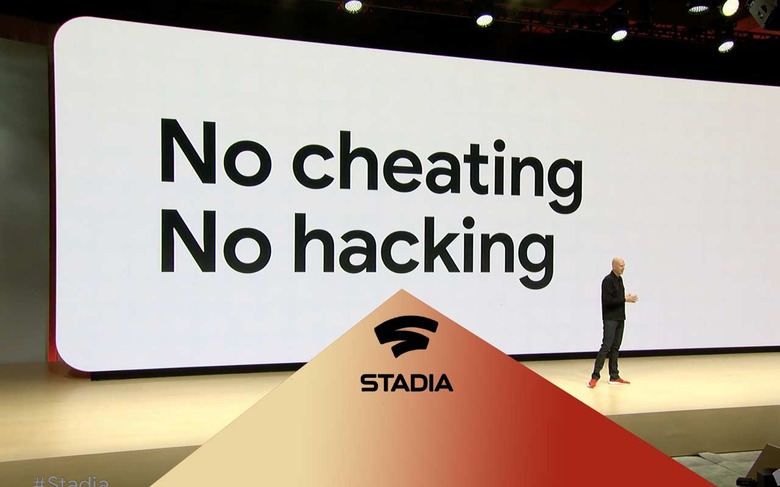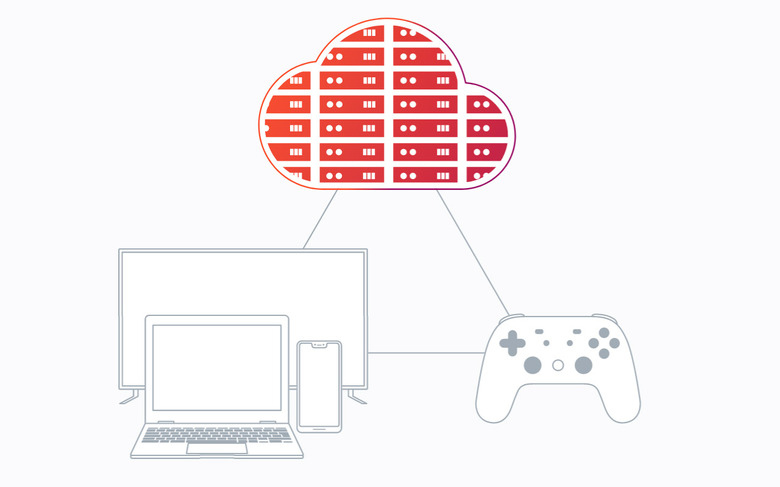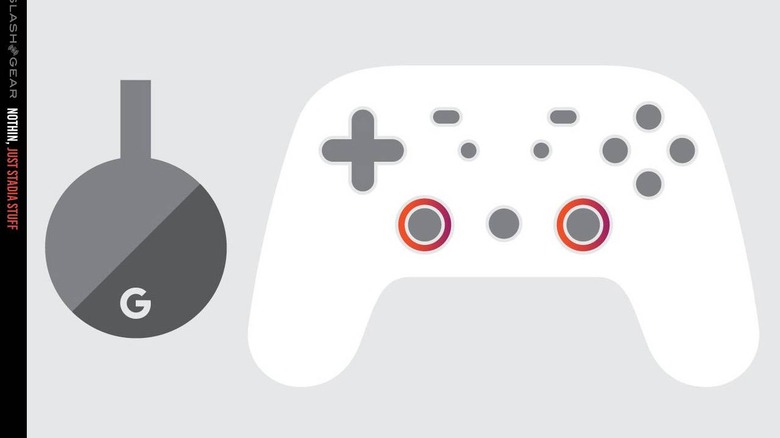Sorry Google, But For Me Stadia Is A Hard Pass
The launch of Google Stadia is right around the corner, and Google will be launching the service with little in the way of competition. At the moment, Sony is really the only major player in the streaming space with its PlayStation Now service, but Stadia certainly sounds much more ambitious. Over the past several months, Google has trickle released information about Stadia and what users can expect, and now that we're just about a week out from release, I can confidently say that Stadia is not the service for me (at least not at the start).
The problems with Stadia, in my opinion, are twofold. Google itself is one of the biggest roadblocks to me actually being excited about Stadia, but even if I weren't hesitant to trust the big G, my ISP on its own gives me more than enough reason to want to avoid the service entirely. Together, though, they pretty much ensure that Stadia is a no-go for me, and I'm guessing I'm not alone in that.

The problem with Google
It's a tale as old as time (or at least the internet): Google is what I like to call a launchaholic. The company seems to be very fond of constantly launching new products and services, seeing what sticks, and killing off the ones that don't.
Many of you are likely already familiar with this nasty habit of Google's, but for those that aren't, you simply need to look at the Google Graveyard to see just how many different apps, services, and hardware Google has killed off throughout the years. At the time of this writing, there are 10 services set to be killed off by Google in the near future, with Hangouts being the most notable app slated to get the axe.
It's been a busy year for Google when it comes to sunsetting products and services too. Just this year alone, the company has dropped support for Daydream, YouTube Gaming, Inbox by Gmail, Google+, and Google Clips. It's been quite a bloody 2019, indeed.
I'm not going to fault a company for ending support for something that clearly isn't working, but a lot of the time Google seems to want to enter a space just because it has the resources to throw at a project, with no clear direction on how it will actually create value or do things differently. I get the feeling that often Google only knows that it wants to succeed in a certain space but doesn't know how it will, and a perfect example of that is Google+, one of the most unnecessary services the company has ever launched.
Google+ had a clear goal – to pull market share away from Facebook and Twitter – but it never had a clear strategy for doing so. As a result, Google+ just sort of floundered for years until Google eventually pulled the plug, blaming low engagement from users as the reason. It feels like Google expected Google+ to succeed just because it was a social network with the Google name attached to, but it's clear that wasn't enough.
So what happens if adoption of Google Stadia is similarly slow at the start? Will Google just let it flounder for a few years before it either kills the service entirely or rebrands it into something new and tries again? The fact that this is even a question I need to ask tells me that Stadia probably isn't something I want to buy into early on.
That isn't to say that Google is only getting into game streaming just because it wants to see if it can make a splash in this space – Google has clearly put a good amount of effort into building out Stadia's functionality. A company with Google's resources and know-how could indeed do a lot to move game streaming out of its infancy and help it become a viable way to buy and play games.

With that said, the way Google is launching Stadia feels needlessly complex. I'm no marketing expert, but it feels like when you're launching a product in a mostly unproven space and that product is acting as your jumping off point for officially entering a new market, you want to cast as wide a net as possible from day one. Google isn't doing that though, because the free version of Stadia – Stadia Base – won't be here until sometime in 2020.
If you want to access Stadia at launch, you need to pay up by purchasing a hardware kit from Google that includes a Stadia controller and a Chromecast Ultra. That bundle also comes with three months of Stadia Pro, which would normally cost $10 per month. Until Stadia Base arrives, subscribing to Stadia Pro will be the only way to purchase and play games through Stadia, and that doesn't strike me as the best idea when you need to sell as many people as possible on the notion that game streaming is actually feasible right now.
Google might be putting up this paywall of sorts to ensure that Stadia's servers aren't flooded with more traffic than they can handle right at launch, but the more cynical side of me thinks that Google is doing this so it can monetize Stadia in some form right away before opening up the service to those who don't want to pay a monthly subscription.
Regardless of the actual reason, I don't think it's a smart move to limit who can and can't access your service at launch when you plan to open it up to everyone later – especially when you're going up against very established platforms that people are more than willing to stick with if they aren't sold on Stadia.
When you add in things like the Stadia controller's limited wireless functionality at launch, it just seems like Stadia is being rushed to market before all of the pieces are in place. That makes me hesitant to support the service right away and rather prompts me to wait to see how Google builds things out in the months to come.
Again, I don't think that's what your potential customers should be thinking when you're acting as a trailblazer in a space that's still very young – they should be chomping at the bit to try out what you have to offer, and as more has come out about Stadia and its limitations at launch, that anticipation has certainly died down for me.

The problem with ISPs
Even if Google were a perfect company with a long track record of supporting the services it launches and Stadia seemed well established on day one, there's still a very real bottleneck for me when it comes to the service: My ISP, which lately has been trying to act more like a mobile carrier than a home internet provider.
Like a lot of people in the United States, my ISP – Xfinity – imposes a monthly bandwidth cap on my home connection. I'm limited to 1TB of data before I start getting charged overages, and I bump up against that limit each and every month since I don't have a cable subscription. Whether I'm watching streams on Twitch, working my way through shows on Netflix, or watching Red Wings games on YouTube TV, all of the entertainment I consume is counting against that monthly data cap.
This is by design, of course. That 1TB data cap is targeted primarily at people like me, who have cut the cord and now get their entertainment through a collection of streaming services. Of course, Xfinity allows me to have "unlimited data" if I pay an additional $50 a month, which isn't something I do because my overages tend to only be in the realm of $10-$20 a month when I happen to go over.

Here's the thing, though: if I were to subscribe to Stadia, the overages would definitely outpace the cost of that $50 unlimited add-on, forcing me to sign up for it. So now, the cost of Stadia is not just whatever I spent on the Founder's Edition/Premiere Edition bundle and the $10 per month cost of Stadia Pro; it's all of that plus the extra $50 a month I'm paying Xfinity to uncap my internet so I can actually play the games I buy through Stadia.
That just isn't going to happen. I can't afford to pay that much just to stream games. Google makes matters worse here by assuming that ISPs will just stop being bloodsucking oligopolists and raise the data caps because of consumer demand. Here's what Phil Harrison said to GameSpot when asked if Google would work with ISPs to solve the problem of data caps as they concern Stadia:
The ISPs in the US where this issue is more prevalent, but not everywhere, so I think it's actually important to remember that this is not a national, nationwide concern. But historically, ISPs have demonstrated that they are very responsive to [consumers' needs]. When music streaming became popular, they lifted the bandwidth limit. When music streaming migrated to YouTube and Netflix streaming, once again the limits went up, and we expect that the limits will continue to rise over time. Partly driven by consumer demand, but also frankly, ISPs are in competition. There is a market dynamic, you know, that we believe will help continue to deliver a great service for gamers. [There are] trials going on with 5G streaming; [bandwidth in homes] that have no caps at all. So I think that we'll continue to see innovation with that.
When GameSpot gave him another chance to not just shrug off the data cap issue, he didn't bite. Asked if there was anything that Google was doing to push ISPs down the path of raising data caps for this new age of game streaming, Harrison simply said, "We think that the ISPs understand the opportunity and will make the innovation."
I'm not sure what Harrison's broadband options at home are, but where I'm at, I have two: Xfinity and AT&T. Both of those companies impose 1TB data caps on their home connections and their plans are priced similarly as well. There is no market dynamic here, just two corporations who have agreed to level the playing field so they don't step on each other's toes and so they don't have to actually compete.
Sure, maybe mobile carriers will force companies like Xfinity to change when 5G becomes a viable option for home internet, but given that the mobile industry already has a slew of anti-consumer problems, I'm not optimistic that will happen. I don't think it's pessimistic to say that Comcast isn't going to suddenly change on its own either, at least not in my market – if it has no true competition, why would it?
Harrison's laissez-faire attitude toward data caps is alarming because Stadia needs that bandwidth in order to succeed. If Google is only going to target the markets where these data caps aren't in place, it's going to be painting itself into an increasingly smaller corner as corporate consolidation continues with little resistance from the federal government and these massive ISPs continue to split the market and turn it more towards an oligopoly. Google tried to compete with these corporations and lost; the government either can't or won't reign them in. If Harrison thinks that Comcast and AT&T will change because consumers want them to, then the man is hopelessly dense.

Wrap-Up
As far as I'm concerned, there are a lot of things working against Google Stadia at the moment, but the biggest one is definitely data caps from ISPs. Whatever flaws Stadia has at launch can eventually be fixed, but consumers aren't going to pay their ISPs more money each month just so they can stream games when many of them already have some kind of machine that can play games locally.
Google has an opportunity to really push for change when it comes to overreaching ISPs, but Harrison seems wholly uninterested in getting involved. This could be a great chance for Google to really build up some consumer goodwill, which is something every company needs when they're attempting to blaze a trail. Harrison's – and by extension Google's – indifference when it comes to data caps and their potential to limit the userbase of Stadia means that I'll be sitting this one out for the foreseeable future.
